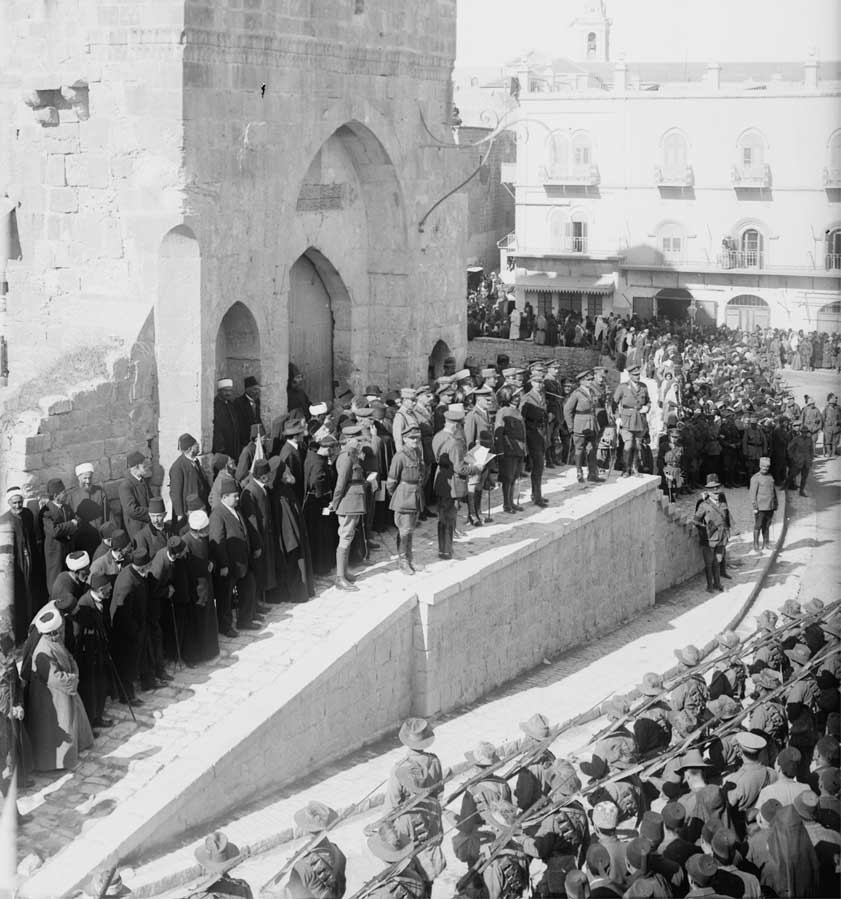Allenby Defeats the Ottomans in Palestine

"General Allenby inJerusalem
Following an extensive campaign that commenced at the Suez Canal in 1915, General Allenby orchestrated the Allied forces’ triumph over the Ottoman Empire in December 1917, culminating in the capture of Jerusalem..
The conflict over Palestine commenced in 1915 when the German-led Ottoman forces embarked on a campaign to capture the Sinai Peninsula and the strategically crucial Suez Canal. At the time, Egypt was a British protectorate.
The Ottoman soldiers were on the verge of success in reaching the canal, but only two companies managed to cross it on February 2, 1915. However, by then, the British had swiftly dispatched an army of 30,000 to the canal, rendering the Ottoman position untenable. Consequently, they withdrew. The Ottomans retreated to the center of the Sinai Peninsula, where they conducted raids on the Suez Canal.
The British concluded that it would be more advantageous to defend the canal by crossing it and pushing the Ottoman forces back. Consequently, the British forces crossed the canal and initiated a substantial logistical effort to supply their troops in Sinai. This effort encompassed constructing a rail line and installing water pipes. On April 23, 1916, the Ottomans, led by German General Kress von Kressenstein, launched a surprise attack on the British forces positioned along the line. Despite overwhelming the British troops guarding the line, the Ottomans promptly withdrew.
By mid-May 1916, the railroad had been extended as far as Romani in Northern Sinai, approximately 23 miles from the canal. British troops established defensive positions there, compromising the Australian New Zealand Mounted Division. On August 4th, the Ottomans launched a forceful attack, which was repulsed after fierce fighting. The Ottomans withdrew to their base at Bir el Abd. Subsequently, ANZC troops pursued them, forcing them to withdraw from that base as well. At this juncture, the Suez Canal was secure from Ottoman attack.
The decision was made to advance across Sinai and attack Ottoman forces in Palestine. The progress was slow, as the British were compelled to construct their railroad and water lines across Sinai at a gradual pace. By December, the line had been built sufficiently close that a British force could undertake a sortie forward. On December 21st, a British force occupied El Arish, which had been abandoned by the Ottomans.
The Ottomans maintained only one base in Sinai, namely Magdhaba. This was captured after an intense battle on December 23rd. On January 9th, the British captured Rafah.
The subsequent stage involved attacking Ottoman troops in Palestine. This was delayed by the departure of some British troops to reinforce the Western Front.
On March 26, 1917, the British troops attacked Gaza, marking the first battle of Gaza. The Ottoman troops repulsed the British attack. The second Battle of Gaza took place from April 17th to 19th. The Ottomans were well-entrenched, and the British were unable to overcome their resistance.
On October 31st, the Allied forces launched an assault on Beersheba, the eastern segment of the Ottoman defense lines. After a grueling day of intense combat, the Allied forces emerged victorious, capturing the city that had been fortified by a force of 4,400 troops.
The Ottoman lines had become excessively extended to effectively defend, and the Allied forces swiftly captured Gaza, advancing northward toward Jaffa. Consequently, the Ottomans were compelled to withdraw from Jaffa, establishing a defensive line along the Yarkon River while simultaneously attempting to safeguard Jerusalem. The initial phase of the battle for Jerusalem commenced outside the city’s boundaries from November 17th to 24th, known as the Battle of Nebi Samuel. By early December, the Ottoman position in Jerusalem had become untenable, leading to their evacuation of the city. On December 9th, the British Army, led by General Allenby, the commander of the campaign, occupied Jerusalem.
The final battle in Palestine commenced on September 19th, 1918. Allenby’s forces launched an attack on Meggido. The surprise nature of the assault rendered the Ottoman army ineffective within hours. Consequently, all of Palestine was now under British control. The casualty figures during the campaign are subject to dispute, but they appear to be slightly exceeding 200,000. This figure is significantly lower compared to most battles on the Western Front, which witnessed relatively limited action. In this instance, over the course of a series of battles, the British successfully displaced the Ottomans from Palestine, Jordan, and Syria, profoundly altering the geopolitical landscape of the Middle East.
 >
>